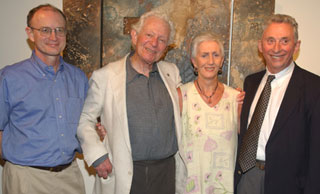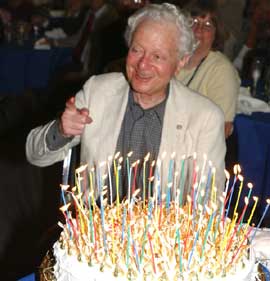 |
|
Lederman at 80Future of the field calls for charisma and courage by Kurt Riesselmann
When Leon Lederman surveys particle physics from the vantage point of his
ninth decade, he sees a field challenged to translate the excitement of future
discoveries into the means and finances to make those discoveries happen.
The 1988 Nobel Laureate is still very much involved in
science and education policy. In addition to serving on many
advisory boards, Lederman is a member of the physics
department at the Illinois Institute of Technology, and is
resident scholar of the Illinois Math and Science Academy, a state-run
residential high school he helped to found.
Science education has become a prime focus of his activities. Lederman, who
was Fermilab director from 1978 to 1989, has played a key role in establishing
Fermilab’s education resources, including raising financial support.
“When Leon came to Fermilab, he was frustrated
that there wasn’t a teaching opportunity,” said
Marge Bardeen, who is the head of Fermilab’s
education department. “So he created one. He
started Saturday Morning Physics to teach
students.
“He was surprised to see that teachers came
along, and so he decided that the lab could do
something for them. He had this idea how we could
make the resources of the lab available to K-12.
He really plowed into this, as you would do to learn
a new scientific field.”
“It isn’t that nobody ever looked at this before,”
Bardeen said. “But Leon has become a focus
for people who are interested in this approach.
He is out there promoting the idea and organizing
support. And Leon having a Nobel Prize certainly
helps. He’s able to bring people together. He calls
and gets people to meet.”
Lederman has given talks around the country to
convince education experts and school boards that
high school science education should begin with
physics and eventually lead up to the most
complex field, biology. Physics is the conceptual
underpinning to the study of systems in many other
fields. Starting with classes in physics exposes
students early on to concepts such as atoms and
electricity, which are, for example, necessary to
explain chemical reactions and communication
among biological cells.
“I am working hard on changing the current
high school science curricula...trying to dump the
one hundred year old biology-chemistry-physics
sequence,” Lederman said. “If you think finding
the Higgs particle is hard...”
On the Web:
The Lederman Science Center
The 1988 Nobel Prize in Physics
|
 “Particle physics suffers more from being infected by the
socio-political mood of the day than from lack of spectacular
opportunities for major and profound discoveries,” said
Lederman, who recently celebrated his 80th birthday.
“ I can’t remember a time—and I go back to Democritos—
when the prospects were as clear. For this, some credit
goes to our close and mutually profitable connections to
astrophysics. But, we must play our cards right, we must
seek out our most charismatic spokespersons and, above
all, each of us must draw courage and confidence from the
incandescent glory of our heritage and from the fascinations
of the work we must do.”
“Particle physics suffers more from being infected by the
socio-political mood of the day than from lack of spectacular
opportunities for major and profound discoveries,” said
Lederman, who recently celebrated his 80th birthday.
“ I can’t remember a time—and I go back to Democritos—
when the prospects were as clear. For this, some credit
goes to our close and mutually profitable connections to
astrophysics. But, we must play our cards right, we must
seek out our most charismatic spokespersons and, above
all, each of us must draw courage and confidence from the
incandescent glory of our heritage and from the fascinations
of the work we must do.”
 “At IIT, I mainly encourage the new HEP group under Dan Kaplan, which is
not only involved in three important Fermilab experiments but has taken a
strong leadership role in helping Fermilab with accelerator problems and R&D,”
said Lederman. “At IMSA, I bring very innovative thinkers to interact with the
students. Nobel types, Poets Laureate, business tycoons, astrophysicists,
military leaders. Also, we do unusual projects like the book that fifteen students
wrote: ‘Portraits of Great American Scientists,’ which presents biographies of
fifteen renowned scientists.”
“At IIT, I mainly encourage the new HEP group under Dan Kaplan, which is
not only involved in three important Fermilab experiments but has taken a
strong leadership role in helping Fermilab with accelerator problems and R&D,”
said Lederman. “At IMSA, I bring very innovative thinkers to interact with the
students. Nobel types, Poets Laureate, business tycoons, astrophysicists,
military leaders. Also, we do unusual projects like the book that fifteen students
wrote: ‘Portraits of Great American Scientists,’ which presents biographies of
fifteen renowned scientists.”
 Today, the staff of Fermilab’s Lederman Science
Education Center and the education department
train and work with six to seven thousand teachers
every year. And about 150 high schools across the
country, including IMSA, have started teaching
science in a physics-chemistry-biology sequence,
an idea heavily promoted by Lederman.
Today, the staff of Fermilab’s Lederman Science
Education Center and the education department
train and work with six to seven thousand teachers
every year. And about 150 high schools across the
country, including IMSA, have started teaching
science in a physics-chemistry-biology sequence,
an idea heavily promoted by Lederman.